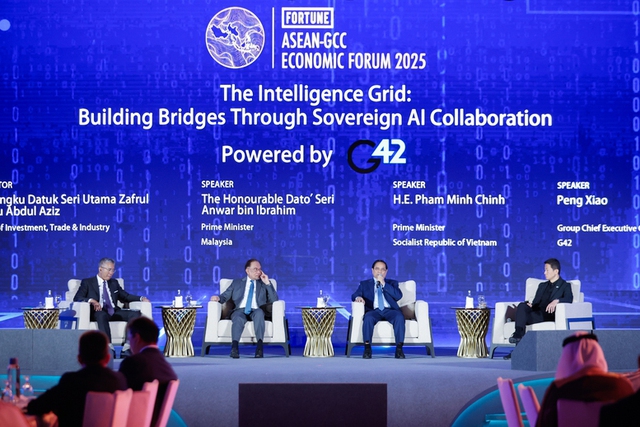Prime Minister joins high-level discussion on artificial intelligence in Kuala Lumpur
VGP - Prime Minister Pham Minh Chinh and his Malaysian counterpart Anwar Ibrahim jointly partook in a high-level discussion session titled “The Intelligence Grid: Building Bridges Through Sovereign AI Collaboration” in Kuala Lumpur on May 28.

Prime Minister Pham Minh Chinh (2nd from R) at the high-level discussion session of ASEAN-GCC Economic Forum 2025, themed The Intelligence Grid: Building bridges through sovereign AI collaboration
AI has deeply penetrated all aspects of life, from communication to business production, contributing to rapid and sustainable development. Viet Nam recognizes ASEAN as a dynamic region with a large market, diverse culture, and affordable labor, while the Gulf Cooperation Council (GCC) has abundant financial resources and advanced technology. Therefore, cooperation between these two regions can effectively complement each other, especially in AI, said Prime Minister Pham.
Pham added that businesses and people play the central role in AI development and economic integration, while the governments bear the responsibility for creating supportive policies and smart, modern, and harmonious institutional frameworks to foster comprehensive development in order to connect the two regions.
He went on to say that AI has both positive and negative aspects, and the crux of the matter is to maximize its benefits and at the same time to minimize adverse effects to overcome challenges and risks posed by AI.
He called on countries to develop AI in a safe, transparent, and controlled manner, to ensure it serves humanity without replacing or dominating humans.
The Prime Minister also underscored the importance of international cooperation by upholding multilateralism and ensuring equal access, technical and financial support for developing countries to promote inclusive and sustainable AI development, toward the goal of leaving no one behind.
He called for cooperation and support in building a harmonized institutional framework that both encourages the development of AI and enables effective control of its negative impacts.
He also called for the development of essential AI infrastructure for electricity, data, and other necessary systems; the training of high-quality human resources who are ethical and humane in their practices; preferential financial resources from wealthy economies for poorer and less developed countries; as well as the transfer of advanced technology and smart governance./.

